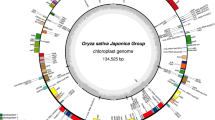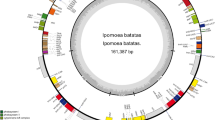Abstract
Two identical “chloroplast-like” tRNAAsn genes, trnN1 and trnN2, have been identified in the potato (Solanum tuberosum) mitochondrial genome. The flanking sequences of trnN1 are unrelated to the corresponding authentic potato chloroplast regions, whilst those of trnN2 are very similar to the chloroplast sequences. The trnN1 copy is present in the mitochondrial genome of various plants whereas the second copy, trnN2, is absent from all the other plant genomes studied so far. Interestingly, both trnN copies are expressed in potato mitochondria. Sequences flanking the chloroplast-like tRNAHis gene (trnH), present as a single copy in the potato mitochondrial DNA, are unrelated to the corresponding chloroplast sequences, whereas chloroplast-derived sequences have been maintained in the vicinity of the maize chloroplast-like mitochondrial trnH gene. However, both the potato and the maize trnH are expressed in mitochondria.
Similar content being viewed by others
Author information
Authors and Affiliations
Additional information
Received: 10 April / 1 August 1997
Rights and permissions
About this article
Cite this article
Fey, J., Dietrich, A., Cosset, A. et al. Evolutionary aspects of “chloroplast-like” trnN and trnH expression in higher-plant mitochondria. Curr Genet 32, 358–360 (1997). https://doi.org/10.1007/s002940050288
Issue Date:
DOI: https://doi.org/10.1007/s002940050288




